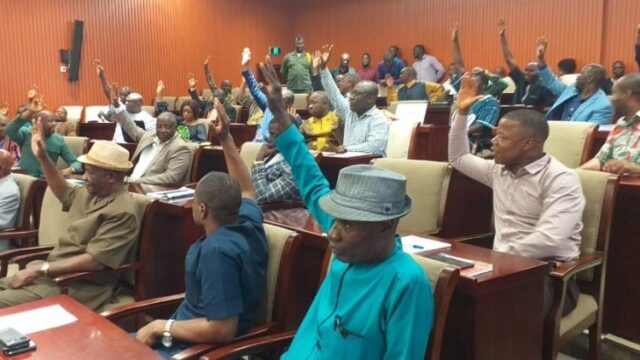
According to Articles 47 and 48 of Liberia’s 1986 constitution, the 55th legislature will officially take office on the second working Monday of January 2024, following the 2023 presidential and general elections.
Before becoming speaker of the Lower House or Senate pro-tempore, many factors must be considered, including political affiliation, lobbying power, and relationships with other colleagues.
Following the election of the 73 representatives and 30 senators, elections will be held for the leadership of both the Senate and the representatives; secretaries and deputy secretaries; and the Sergeant-at-Arms, followed by the appointment of various committee members who will serve for six years or be removed for cause.
During the first day of sitting, the legislature is expected to elect a new leadership that includes the speaker, who is referred to as the first among equals and the third most powerful individual in the country. This will be presided over by the secretary of the senate, after which the oath of office shall be administered.
The deputy speaker, secretary, and deputy secretary, as well as the sergeant-at-arms election, will be presided over by the speaker subsequently after his or her election.
In the same way, according to Chapter 5 Rule 14 of the Senate rules on elections, on the first day of the regular session following a general and presidential election, the Secretary of the Senate, or in his or her absence, the Assistant Secretary of the Senate, whose term shall not expire until his or her successor is elected, shall call the Senate to order, conduct devotions, and announce to the senators present that the Senate is without a President Pro-Tempore to serve for a term of six years.
“The President Pro-Tempore shall be elected by a simple majority of the duly seated Senators. The election of the President Pro-Tempore shall be held, and the Secretary of the Senate shall then administer the oath of office and appoint a Special Committee, which shall escort the President Pro-Tempore to his or her seat.”
During the Fourth Day Sitting of the First Session immediately following a general and presidential election, the Senate shall elect the following three officers: (a) Secretary of the Senate; (b) Assistant Secretary of the Senate; and (c) Sergeant-at-Arms of the Senate. Section 3: Officers of the Senate: The Officers of the Liberian Senate shall be: President Pro-Tempore Secretary of the Senate, Assistant Secretary of the Senate, and Sergeant-at-Arms of the Senate Chairpersons of the leadership committees as defined in Rule 43 (a) 10,” the Rule added.
The current election is between the current Deputy Speaker, J. Fonati Koffa, who is supported by the ruling Coalition for Democratic Change (CDC), and Richard Nagbe Koon, supported by the incoming ruling Unity Party and her alliances.
Since the election of Alex J. Tyler in 2007 and his removal through a resolution signed by 49 members of the House of Representatives in keeping with Article 49 of the Constitution, the House of Representatives has not had a competitive election for the speaker’s position but has always reached a consensus for the speaker’s position.
The election of Margibi senator James Emmanuel Nuquay was done on a white ballot that was cast by Montserrado County District #1 lawmaker, Josephine Francis, on behalf of the 73 representatives in 2016.
In 2017, after the general and legislative elections, the house also reached an agreement to elect Maryland County District #2 representative, Bhofal Chambers, as speaker from the ruling Coalition for Democratic Change (CDC), while the opposition produced the deputy speaker, Bong County lawmaker, Prince Moye, to create a balance in the leadership.
However, the Deputy Speaker’s election was contested by Hans Barchue, Grand Bassa County District #1 representative, who was the sitting deputy speaker then. Moye won with 41 votes and Barchue got 25 votes.
During the 2020 mid-term senatorial election, Moye was elected senator, leaving the deputy speaker position vacant. There was an election held that brought to power the deputy speaker, J. Fonati Koffa, who is now contesting for the speaker position.
Koffa was elected with 45 votes on Tuesday, while Clarence Massaquoi, nominated by the Collaborating Parties Legislative Caucus (CPP), came in second with 20 votes.
Frontpage Africa legislative reporter Gerald C. Koinyeneh told The Stage Media that the 2024 speaker election may not be as consensus-based as previous elections because Koffa is heavily supported by the outgoing ruling CDC, whereas his main rival, Montserrado County District #11 representative Koon, is supported by the Unity Party and her alliances.
This, according to Koinyeneh, does not give room for consensus but rather a battleground, adding, “They have confirmed that Musa Bility, the chairman of the opposition CPP, who is very influential, has emerged with Koon. If that happens, the race will be very tough because the CDC has majority lawmakers (25) in the House, followed by the independent candidates, the Unity Party and her alliances, and other smaller parties like the CPP.”
Koinyeneh said both sides will seek the support of those independent candidates, adding that Bility is very influential and, as such, there might be a narrow win.
He said that currently, many lawmakers are supporting Koffa, and his lobbyist power can not be overlooked.
“Out of the 73 lawmakers, 37 need to vote for a person to become a speaker and we are seeing 42 lawmakers who have signed to vote for Fonati Koffa, so if they are sincere, that means he has already won, but as we all know, in politics, anything can happen,” Koinyeneh said.
According to Koinyeneh, as the process continues, one party will likely dominate the House of Representatives because if one side wins the speaker position, the possibility of winning the deputy speaker election, which will be held after the speaker election, will be high.
The Senate Election
In 2015, the Senate elected Gbarpolu County Senator Armah Jallah as President Pro Tempore, defeating his main opponent, Senator Joseph N. Nagbe of Sinoe County, by 13 to 11 votes. Oscar Cooper, the senator from Margibi County, received three of the 27 votes cast.
Jallah replaced Gbehzohngar Milton Findley, who is said to be contesting the incoming senate pro-tempore election against Nyonblee Karnga-Lawrence of the Unity Party alliance.
In 2018, the senate election did not conduct an election as was seen with the case of Jallah; rather, there was a resolution signed by over 27 senators that elected Grand Kru County Senator Albert Tugbe Chie as Pro Tempore and the 10 Statutory Committee members.
“The Secretariat of the Senate disclosed that the resolution became necessary following an announcement by Lofa County Senator Stephen Zargo late Sunday evening of his withdrawal from the race to keep the Senate united,” according to the Independent Probe Newspaper.
The motion of resolution proffered by Grand Bassa Senator Karnga-Lawrence then also called for the elevation and upgrading of the Committees on Public Works and Education to leadership status. This followed the passage of another resolution electing reshuffled members of the eight-member leadership committee in the 2018 senate election.
However, according to Koinyeneh, the 2024 election will not be a resolution but appears to be a race between two senators from Grand Bassa, Karnga-Lawrence and Findley.
He said the race has been referred to as the ‘Bassa Race’, adding that Karnga-Lawrence is supported by UP and her alliances due to her support for President-elect Boakai, even though she was not selected as his vice running mate, while Findley is heavily supported by the two US-sanctioned senators, Nuquay and Chie.
According to Koinyeneh, both Chie and Nuquay wanted to have contested the pro-tempore election but due to the sanctions imposed by the US Department of State, they will not participate but rather support Findley, who once served as pro-tempore.
Koinyeneh said of those two candidates in the race, Karnga-Lawrence is more influential because UP and alliance senators are supporting her and some independent candidates might also support her.
“Besides, she is the head of the senate’s committee on Rules, Order, and Administration, but she does not underwrite Findley because he has been a senator and held that position before and supported the CDC in the runoff election, so with those top CDC candidates not being able to participate in this election, they will want to do everything possible for Findley to win the election.”
Expert’s View
Matthias Yeaney, former Executive Director of IREDD, says he thinks the country might see a Unity Party alliance between the Senate and an opposition CDC House of Representatives.
“Often, the race for the speaker is marred by who has the deepest pocket. However, this race is marred by the opposition CDC having more members in the House of Representatives, and Cllr. Koffa has the deepest pocket.”
He goes on to say that, as a result, I believe Cllr. Kofa will be elected speaker because he has the support of the majority, which is on the CDC side. Also, I think there will be a compromise for the house to have an opposition speaker and a ruling party as a deputy.”
Adama Dempster, a human rights activist, said the rules of the legislature need to be applied correctly to serve the interests of the public. If anything is added, the public will experience the same old legislature.
“We will continue to suggest that policies that will be directed to them for enactment must be done in keeping with the laws of the legislature, not just listening to the executive and just passing bills that have not been discussed. That is a bad legislative proceeding,” Dempster told our reporter.
Dempster wants some legislative proceedings that have a major impact on the country to be open to enable the audience to understand some of those enactments that will improve their livelihood, something he said was not seen in the last six years.
“I think the new legislature should be more open to the people who elected them. If that happens, it helps the public understand the workings of that body when it comes to representation in the interest of the people; so let them not see themselves as the employer because it was the Liberian people who elected them; that is why they are paid with taxpayer money to perform their legislative responsibilities,” he added.
According to Dempster, oversight requires regular consultation with the public about legislative policies, hearings, and constituency meetings from the various counties they represent and stopping taking bribes as a means of fighting against corruption.
Dempster stated that those who have been investigated for corruption and found to be of high quality should not be allowed to vote in the speaker’s election, noting that “a speaker should be someone who will be able to make a better representative, not someone with a criminal record.”
“If the legislature wants to be a body that will fight corruption, those that are elected should not be associated with criminal activities. That will show more credible legislative leadership with high respect but if they do not do the due diligence, they will still be like the past we have seen,” he pointed out.
However, both Dempster and Yeaney want to see a balanced legislature.




